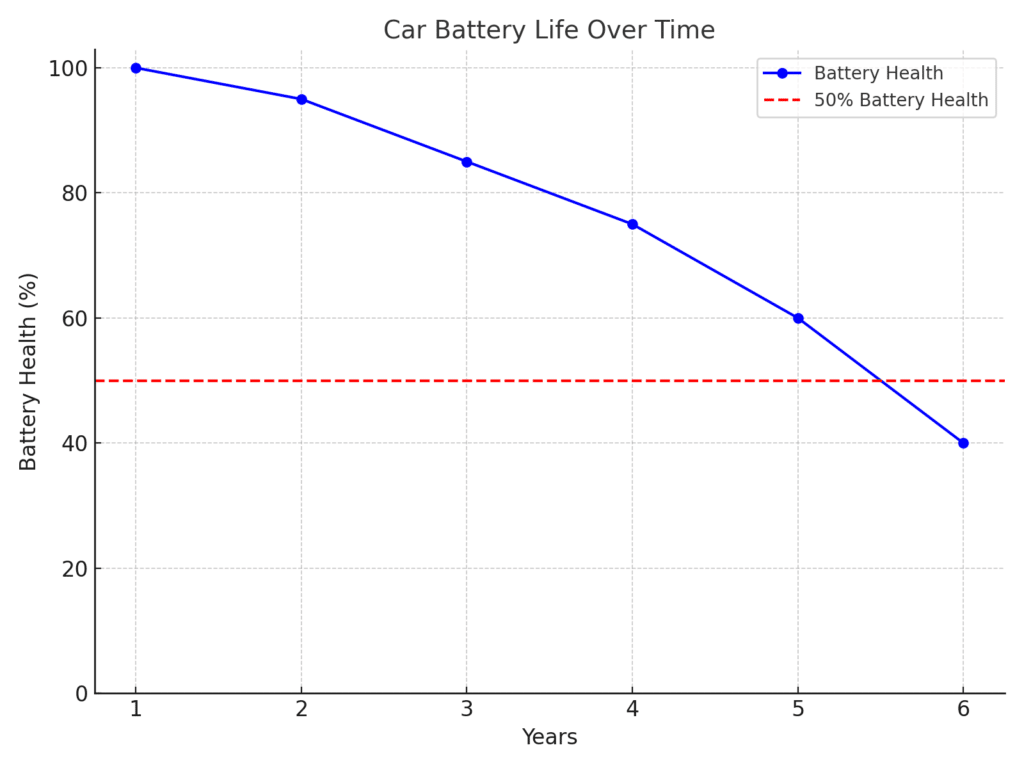How long does a car battery last? It’s a question worth exploring because knowing when to replace your battery can save you from frustrating roadside emergencies. Let’s dive into the details to help you stay on top of your car’s health.
Table of contents
- How Long Does a Car Battery Last on Average
- What Shortens Car Battery Life?
- What kills your car battery the most?
- How long can a car battery last without driving?
- How many kilometers or miles does a car battery last?
- What are the signs of a failing car battery?
- How does a weak battery affect a car?
- How to check car battery health?
- Can a car start after the battery dies?
- Conclusion
How Long Does a Car Battery Last on Average
On average, they last about three to five years. However, there are a number of variables that might affect this range. Things like weather conditions, driving habits, and even the type of battery you have to play a big role. If you frequently drive short distances, your battery might not charge fully, shortening its lifespan. On the other hand, consistent long drives can keep it in better shape.
What Shortens Car Battery Life?
Several factors can significantly reduce a car battery’s lifespan:
1. Extreme Temperatures
Hot weather accelerates the evaporation of battery fluid, which can damage internal components. Similarly, freezing temperatures can make it harder for the battery to deliver sufficient power, especially if it’s already weak.
2. Frequent Short Trips
If your drives are typically short, the battery doesn’t get enough time to recharge fully. This pattern can lead to chronic undercharging, which shortens the battery’s life.
3. Poor Maintenance
Neglecting to clean battery terminals or check fluid levels can lead to corrosion and decreased efficiency. Over time, this neglect can lead to early failure.
4. Electrical Drains
Leaving lights, electronics, or other devices on when the car is off can drain the battery quickly. Repeated deep discharges reduce the battery’s overall capacity.
5. Faulty Charging System
If your car’s alternator isn’t working properly, the battery may not recharge adequately. Overcharging or undercharging can both shorten its lifespan.
6. Vibration
Loose connections or a poorly secured battery can lead to excessive vibration. This can damage internal components, reducing their lifespan.
7. Aging
No matter how well you maintain it, every battery eventually reaches the end of its life. Most will last three to five years before showing signs of wear.
What kills your car battery the most?
Among all the factors, one of the biggest culprits is leaving electrical components on when the engine is off. Lights, infotainment systems, and chargers can drain the battery rapidly if not turned off. Combine this with extreme weather conditions or an old, weak battery, and you’ve got a recipe for failure.
Additionally, a malfunctioning alternator that either overcharges or undercharges the battery can be a silent killer, leading to unexpected breakdowns.

How long can a car battery last without driving?
Depending on a few key factors, a car battery can typically last two to four weeks without being driven.
1. Battery Condition
If your battery is relatively new and in good condition, it can hold a charge longer, typically up to a couple of months.
Batteries that are older or already showing signs of wear may lose their charge more quickly, potentially within a few weeks.
2. Parasitic Drain
Modern cars have electronics (like alarms, clocks, and infotainment systems) that draw a small amount of power even when the car is off. This “parasitic drain” may eventually deplete a battery.
3. Temperature
Extreme temperatures—whether too hot or too cold—can significantly impact the battery’s health. Cold weather, for example, can reduce a battery’s ability to hold a charge, while heat can accelerate the chemical reactions inside the battery, causing it to drain faster.
How many kilometers or miles does a car battery last?
The lifespan of a car battery is typically measured in time rather than distance, but to give you an idea, most car batteries last between 3 to 5 years. This translates to approximately 50,000 to 100,000 kilometers (or 30,000 to 60,000 miles) of driving, depending on various factors.
Several key elements influence how long your car battery will last:
1. Driving Habits
Short trips that don’t allow the alternator to recharge the battery fully can shorten its lifespan. Ideally, the car should be driven for longer distances regularly to help maintain the charge.
2. Climate
Extreme temperatures, especially hot weather, can reduce the life of the battery. In cold climates, the battery might struggle to perform as well, but it’s the heat that generally wears it down faster.
3. Battery Maintenance
If you regularly maintain the battery (checking for corrosion, ensuring clean terminals, etc.), it can last longer.
4. Age of the Battery
Like all components of a vehicle, the older the battery, the less efficient it becomes. A battery that’s over 3 years old might start losing its charge more quickly, especially if you don’t drive frequently.
What are the signs of a failing car battery?
Recognizing the signs of a failing car battery can save you from unexpected breakdowns. Here are the most common warning signs:
1. Slow Engine Crank
If your car’s engine takes longer than usual to turn over when starting, it’s often a sign that the battery is struggling to provide sufficient power.
2. Dim or Flickering Lights
Headlights: Dim headlights when the car is off or idling can indicate a weak battery.
Dashboard and Interior Lights: Flickering or unusually dim lights on the dashboard or inside the cabin also signal battery trouble.
3. Clicking Sound When Turning the Key
If you hear a clicking sound but the engine doesn’t start, it could mean the battery doesn’t have enough charge to power the starter motor.
4. Electrical Issues
A failing battery can cause problems with the car’s electrical components, such as:
- Power windows operating slower than usual.
- The radio or infotainment system is malfunctioning.
- Difficulty with power locks or other accessories.
5. Battery Warning Light
If the battery or charging system warning light appears on your dashboard, it may indicate a problem with the battery, alternator, or charging system.
6. Corroded Battery Terminals
Check the battery terminals for white or blue-green powdery buildup. Corrosion can lead to poor connections and affect performance.
7. Swollen or Bloated Battery Case
Extreme temperatures can cause the battery case to swell or deform, indicating internal damage. A swollen battery usually needs immediate replacement.
8. Frequent Jump-Starts Needed
If you often need to jump-start your car, your battery is likely nearing the end of its life, especially if it’s over three years old.
9. Unpleasant Smell
A sulfuric or rotten egg smell around the battery may indicate a leak or internal damage.
10. Old Age
If your battery is over 3–5 years old, it’s worth checking its performance regularly, even if it shows no obvious signs of failure.
How does a weak battery affect a car?
A weak car battery can affect your car in various ways, often leading to reduced performance, electrical issues, or even a complete inability to operate.
1. Difficulty Starting the Engine
A weak battery struggles to provide enough power to start the engine, resulting in a sluggish or prolonged cranking sound.
In extreme cases, the car won’t start at all, leaving you stranded.
2. Poor Performance of Electrical Components
- Dim Lights: Headlights, interior lights, and dashboard lights may appear dimmer than usual.
- Infotainment Issues: The radio, navigation system, or infotainment screen may malfunction or reset.
- Power Accessories: Features like power windows, locks, and heated seats may operate slower or inconsistently.
3. Stress on the Alternator
A weak battery forces the alternator to work harder to supply power to the car’s systems, leading to:
- Premature alternator wear or failure.
- Reduced fuel efficiency since the alternator draws more power from the engine.
4. Trouble with Safety Features
- ABS (Anti-lock Braking System): A weak battery may cause the ABS warning light to come on due to insufficient voltage.
- Airbags: Certain systems, like airbags, may not function properly if the battery is too weak to power the diagnostic checks.
5. Warning Lights on the Dashboard
The battery warning light or other system alerts (such as the check engine light) may illuminate, often caused by inconsistent or low battery voltage.
6. Risk of Stalling
A weak battery can struggle to supply steady power to the engine’s electronic components, especially at idle, causing the engine to stall unexpectedly.
7. Increased Emissions
If the car’s sensors and electronic control systems receive inadequate power, the engine may run inefficiently, leading to higher emissions and possible failure of emission tests.
8. Resetting or Loss of Settings
Memory settings in radios, seat positions, or climate control systems can reset or be lost due to low power.
The clock and trip meters may need to be reconfigured after a weak battery disrupts the electrical supply.
9. Risk of Being Stranded
A weak battery is more likely to completely fail in extreme temperatures (hot or cold), preventing you from starting your car when you need it most.
How to check car battery health?
Checking your car battery’s health regularly can help you avoid sudden breakdowns and ensure your vehicle is always ready to go. How you can check the car battery health:
1. Visual Inspection
- Corrosion or Dirt: Look around the battery terminals for any white, crusty residue (corrosion) or signs of dirt. Using a solution of baking soda and water, clean the terminals if necessary. Corrosion can affect battery performance.
- Cracks or Leaks: Inspect the battery casing for any visible cracks or leaks. A damaged battery could be dangerous, and you should replace it immediately.
2. Check the Battery Voltage
A healthy, fully charged battery should read around 12.6 volts or slightly higher when the car is off. You can use a digital multimeter to measure this:
- Set the multimeter to measure DC voltage.
- Connect the red probe to the positive terminal and the black probe to the negative terminal.
- A reading of 12.6V or above is good; if it reads below 12.4V, it may indicate the battery is losing charge.
Can a car start after the battery dies?
In most cases, a car cannot start once the battery has fully died, as the battery provides the electrical power needed to turn the engine over and power the electrical systems. However, there are a few ways to get the car running again or at least give it a temporary boost.
1. Jump-Starting the Car
If your battery is dead but not completely damaged, you can jump–start the car using jumper cables and another vehicle with a working battery. The electrical current from the other car’s battery will help power your vehicle enough to start the engine.
If you don’t have another car, you can also use a portable jump starter or battery pack. These kits are designed to provide enough charge to start your vehicle, but they only work if the battery hasn’t been damaged.
2. Charging the Battery
If you can access a battery charger, you can plug it into your car’s battery to recharge it. This method can take several hours, but it can bring your battery back to life long enough to start the car.
Some battery chargers offer a “trickle charge” setting that will charge the battery slowly over time, which might be helpful if the battery has drained slowly due to regular use.
3. Battery Replacement
When the Battery is Completely Dead: If the battery is beyond recovery (for example, if it’s too old or damaged), jump-starting or charging won’t work, and the car will not start. In this case, you will need to replace the battery before the car can be started again.
4. Other Considerations
If your battery dies due to a faulty alternator (the part of the car that charges the battery while the engine is running), a jump-start may only work temporarily. Once the car is turned off again, it may not start again if the alternator is not replaced.
Can I Bring My Battery to AutoZone?
Conclusion
Understanding how long a car battery lasts and the factors that affect its lifespan can help you avoid unexpected breakdowns and ensure the reliability of your vehicle. While most car batteries last between 3 to 5 years, factors like extreme weather conditions, driving habits, poor maintenance, and electrical drains can significantly shorten their lifespan. Regular maintenance, such as cleaning battery terminals and monitoring voltage, can help extend the life of your battery.
Recognizing the early signs of battery failure, such as dim lights, slow engine cranks, or a battery warning light, can save you from being stranded. If your battery is nearing the end of its life, replacing it before it fails completely is crucial for your car’s performance and safety.
With proper care and regular checks, you can ensure that your car’s battery stays in good shape, reducing the chances of sudden failure and prolonging its useful life.







